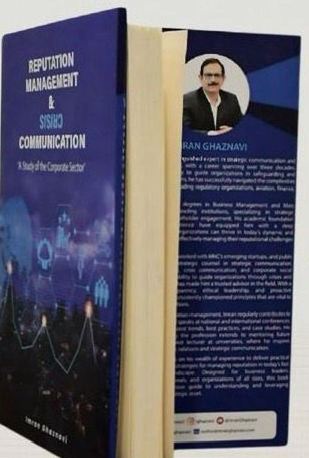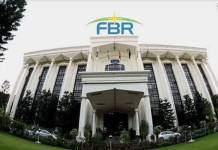Title: Reputation Management and Crisis Communication
Author Name: Imran Ghaznavi
Price: Rs:
Reviewed by: Ansar Mahmood Bhatti
ISLAMABAD, JUN 6 /DNA/ – The boardroom was silent when the call came in. A whistleblower had leaked internal documents to the press. The CEO’s face turned ashen. Shares plummeted 30% in pre-market trading. By noon, regulators were circling. Within a week, a 50-year-old brand was fighting for its life.
This wasn’t just a crisis—it was a reputation assassination. And according to Imran Ghaznavi’s groundbreaking book, “Reputation Management and Crisis Communication: A Study of Corporate Sector”, it was entirely preventable.
The Silent Killer in Corporate Risk Reports: Ghaznavi’s investigation reveals a chilling reality: 83% of Fortune 500 companies lack formal reputation risk oversight at the board level—despite reputation failures causing 65% of market value collapses since 2010 (per Harvard Business Review data).
“Reputation risk isn’t a footnote—it’s the black box of corporate survival,” Ghaznavi told this reporter during a tense interview. “Yet most risk committees treat it like a PR problem, not a governance time bomb.”
His findings expose that the Governance Gap: Only 12% of S&P 500 boards have a dedicated reputation risk committee. The Speed Trap: In the digital age, crises go global in under 19 minutes—but the average corporate response takes 47 hours. The Trust Tax: Companies with weak reputation systems pay 7.5% more for capital (MIT Sloan data).
The Ghaznavi Doctrine: A SEAL Reputation Team Six for Corporate
Drawing over 30 years of frontline experience—including advising multinationals, public sector institutions during the 2008 financial crisis and the COVID-19 pandemic—Ghaznavi prescribes wartime-style preparedness:
1. The Boardroom Battlefield: Mandate “monthly reputation risk briefings” alongside financial reports. Tie “30% of C-suite compensation” to reputation KPIs (employee trust scores, social media sentiment)
2. The 60-Minute Response Rule: Pre-drafted crisis playbooks for “17 worst-case scenarios” (CEO scandal, cyberattack, activist attack). “Dark site” media portals ready to launch in 15 minutes
3. The Truth Dividend: When a Ghaznavi-advised the chairman of a national airline (PIA -2006) during initial days of ban its on flights in Europe, to have patience handling main stream media. The silent fight between the CEO of a national newspaper and the airline made it worse to handle public image of the airline which ultimately resulted in serious financial and reputational loss.
Why Regulators Are Taking Notes: Globally the Federal Reserve stress tests now include “reputation contagion scenarios”. The SEC is debating on mandatory reputation risk disclosures.
“Ghaznavi’s work proves reputation isn’t soft science—it’s the new systemic risk,” says the regulatory expert.
The Bottom Line: A Corporate Survival Kit for, CEOs: Your next crisis isn’t coming—it’s already here, investors: Demand reputation audits like you scrutinize balance sheets. Business executives: This is your anti-Black Swan playbook.
As Ghaznavi warns: “The companies that survive this decade won’t be the biggest or the richest—they’ll be the most trusted.”

















